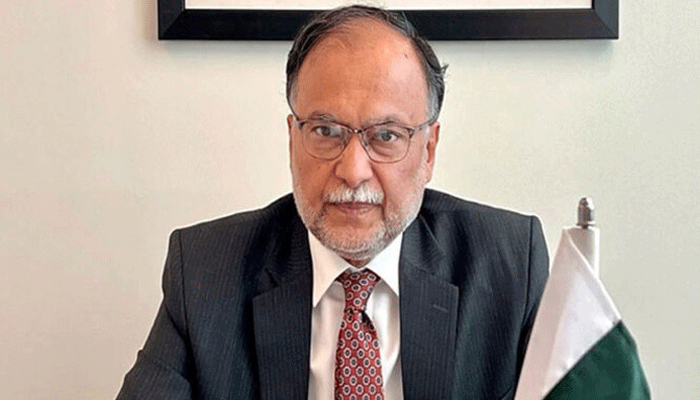‘CPEC-2 attractive investment destination’
Islamabad:Federal Minister for Planning, Development and Special Initiative Ahsan Iqbal has said that China Pakistan Economic Corridor (CPEC) is a transformative force for Pakistan's economy, shifting it from the brink of collapse to an attractive investment destination.
The Minister was speaking as chief guest at a seminar on “CPEC 2: prospects and challenges” organised by Institute of Regional Studies (IRS). Mr Iqbal highlighted the strong bond of trust and shared vision between China and Pakistan enabling them to overcome initial challenges. Now, as they enter the second phase, the focus will be on industrial collaboration, regional connectivity and socioeconomic development.
He asserted that for CPEC to be successful, it is crucial to establish peace, political stability and continuity of policies while demonstrating a continuous commitment to reforms. CPEC 2 aims at enhancing technologies, creating job opportunities and ensuring food security through agricultural mechanisation. As we embark on this journey, it represents a critical opportunity for Pakistan to build a brighter future for generations to come, the Minister said adding that we must unite as one nation and one team to ensure the success of CPEC 2.
Yang Nuo, Minister Counsellor of the Embassy of People's Republic of China delivered special remarks on CPEC. He stated that the second phase of CPEC is poised to generate new momentum for Pakistan's development, building on the project's success over the past 11 years which attracted $25 billion in investments and transformed the country's economic and social landscape. Chinese President Xi Jinping and Pakistani leaders reached a consensus on advancing integration and enhancing Pakistan's economic and social development through the second phase of CPEC. The joint efforts will focus on developing Special Economic Zones (SEZs), accelerating project implementation and increasing Pakistan's agricultural exports to China thereby contributing to both China's modernisation and Pakistan's growth.
Senator Mushahid Hussain Sayed stated that the centre of power is shifting from the West to the East. China is becoming a scientific super power contributing 40 percent of research on AI and established top ranking universities. China’s diplomacy and role in the world has also broadened, he added. He stressed that there is a broad national consensus on CPEC in Pakistan, demonstrated by all parties unity on June 21 during a meeting with the visiting member of the Communist Party Central Committee Liu Jianchao which reaffirmed strong support to CPEC.
Dr Ashfaque Hassan Khan, Dean of Social Sciences, NUST, emphasised that making CPEC a regional initiative involves more than just infrastructure development. He noted that CPEC is a comprehensive project aimed at promoting connectivity, regional cooperation and integration. Its success is reflected in the participation of over 150 countries and 40 international institutions, underscoring its potential as a regional initiative.
Prof Zhang Jiadong, Fudan University, said that Pakistan and China are good friends, and good friends help each other. He emphasised the importance of dispelling propaganda regarding Chinese companies and focusing on frameworks to create more jobs and business opportunities. Additionally, he highlighted the need to avoid mistrust and address security issues. Dr Hasan Daud Butt, Bahria University, underscored the importance of transitioning from a G2G to a B2B model of development in CPEC Phase 2. He also emphasised that urban-rural synergy is crucial for the success of CPEC Phase 2, citing the example of the Hakla-DI Khan Road as an illustration of this synergy. Khalid Taimur Akram Executive Director, Pakistan Research Centre for a Community with a Shared Future, and Jauhar Saleem, President, IRS, also spoke on the occasion.
-
 King Charles, Princess Anne, Prince Edward Still Shield Andrew From Police
King Charles, Princess Anne, Prince Edward Still Shield Andrew From Police -
 US Set To Block Chinese Software From Smart And Connected Cars
US Set To Block Chinese Software From Smart And Connected Cars -
 Carmen Electra Says THIS Taught Her Romance
Carmen Electra Says THIS Taught Her Romance -
 Leonardo DiCaprio's Co-star Reflects On His Viral Moment At Golden Globes
Leonardo DiCaprio's Co-star Reflects On His Viral Moment At Golden Globes -
 SpaceX Pivots From Mars Plans To Prioritize 2027 Moon Landing
SpaceX Pivots From Mars Plans To Prioritize 2027 Moon Landing -
 King Charles Still Cares About Meghan Markle
King Charles Still Cares About Meghan Markle -
 J. Cole Brings Back Old-school CD Sales For 'The Fall-Off' Release
J. Cole Brings Back Old-school CD Sales For 'The Fall-Off' Release -
 GTA 6 Built By Hand, Street By Street, Rockstar Confirms Ahead Of Launch
GTA 6 Built By Hand, Street By Street, Rockstar Confirms Ahead Of Launch -
 Funeral Home Owner Sentenced To 40 Years For Selling Corpses, Faking Ashes
Funeral Home Owner Sentenced To 40 Years For Selling Corpses, Faking Ashes -
 Why Is Thor Portrayed Differently In Marvel Movies?
Why Is Thor Portrayed Differently In Marvel Movies? -
 Dutch Seismologist Hints At 'surprise’ Quake In Coming Days
Dutch Seismologist Hints At 'surprise’ Quake In Coming Days -
 Australia’s Liberal-National Coalition Reunites After Brief Split Over Hate Laws
Australia’s Liberal-National Coalition Reunites After Brief Split Over Hate Laws -
 DC Director Gives Hopeful Message As Questions Raised Over 'Blue Beetle's Future
DC Director Gives Hopeful Message As Questions Raised Over 'Blue Beetle's Future -
 King Charles New Plans For Andrew In Norfolk Exposed
King Charles New Plans For Andrew In Norfolk Exposed -
 What You Need To Know About Ischemic Stroke
What You Need To Know About Ischemic Stroke -
 Shocking Reason Behind Type 2 Diabetes Revealed By Scientists
Shocking Reason Behind Type 2 Diabetes Revealed By Scientists




